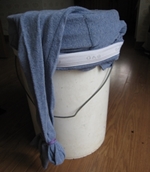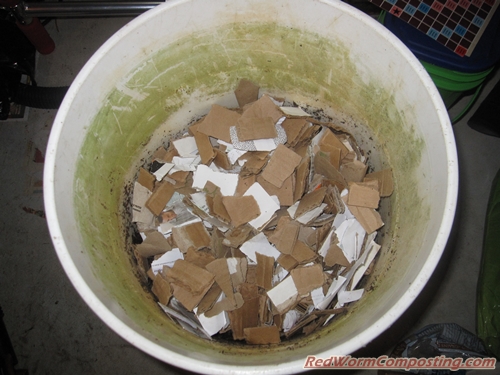December 2014
Hamster Bedding in a Worm Bin?
Question from Lisa:
My 7 yr old put his hamster bedding in the bin, not sure if that is good for them due to the urine and poop, is it going to kill them?
Hi Lisa,
This is a good question – and it’s great that you are considering some of the potential hazards as well! In a nutshell, YES you should be able to use hamster bedding but – depending on the concentration of urine – there’s a decent chance it will require some pre-treatment.
Urine is the main concern since it contains salts and has the greatest potential for ammonia release (urea converts to ammonia quite readily) – both of these are very dangerous for worms.
If you are looking for a low-effort approach (more…)
**Want Even More Fun With Worms? Sign Up for the RWC E-mail List Today!**Breathable Bucket Bin – 12-19-14

It’s been a little over a month since my last “Breathable Bucket Bin” update.
In that blog post I mentioned my decision to try and “push my luck” by adding a bunch more food to the system. Since then, I have basically just left everything alone.
Today, I decided it was finally time to take a look and – more interestingly – dump everything out to see what’s been going on down below!
Right off the bat, it was pretty clear that the overall level in the bin had dropped a fair bit.
But based on the weight and (more…)
Aging Food Waste “Too Much”?
Good question from Mary:
I prepare worm food. Bananas, veggies, oats and grits. Blend them, freeze them and serve when needed.(I let them sit out at outside temp while thawing and for a few weeks to get it really microbial) I started a nursery of babies and I put some of the babies directly in the food. They started wiggling like crazy. I thought they like it, but it killed them.? Was it too much nitrogen? The adults have not died, but I have not put them directly in the food. Do you know what happened?
Sad Momma…..
Hi Mary,
I’m really glad you wrote in about this, since you’ve hit on one of the many important nuances of vermicomposting. In a nutshell, YES microbes are important, and YES aging is a great way to increase microbes. BUT it’s very important that we make sure it’s aerobic microbes we are nurturing – and they require a particular type of aging.
Everything you’ve described sounds great…except for the part about leaving the food waste slurry to sit for a few weeks!
The problem is that a mix like that will (more…)
Kale Trees and Monster Squash
It’s cold and blustery up here these days, so pictures like these – taken earlier in the fall – always give me a boost (and yes, I’m a little biased, I’ll admit – lol).



Life is fun when you combine kids and worms and gardening, I tell ya!
😎
Composting Human Waste With Worms
Back in November I was contacted by Will Milliken, the person in charge of some composting toilets at an aquatic research center. He seemed pretty passionate about what he was doing (and excited by the results from using composting worms), so I asked about the possibility of sharing his experience here on the blog.
Here’s what he had to say:
My name is Will. I got a “real job” in 2000 as a Facilities Technician – Maintenance Mechanic at Stroud Water Research Center. It is an Aquatic Environmental Research Campus located in Avondale, Pennsylvania.
Being an environmentally conscious organization, they had installed a BioSun composting toilet system prior to my hiring date. The previous maintenance man put in the required mulch/wood chips of the time and then let it go.
When I started working here, it was brought to my attention that (more…)
Raising Worms For Fishing
Questions from Luke:
Hi – I recently decided to try and make a worm farm so I can go out fishing more often and was wondering if a L48cm (~18.9″) x W43cm (~16.9″) x H64.5cm (~25.4″) bin would be ideal to start one with roughly 1000 worms? If so, how should I go about making it? Thanks for helping.
Hi Luke,
Normally, I’d likely say your bin was “too deep” – but based on my recent experimentation with bucket systems and passive worm bins, my hunch is that your bin of choice could actually work quite well for your particular needs.
My suggestion, though, would be to get yourself one or (ideally) two more of them. You might be able to produce enough worms in a single bin to provide a sustainable, ongoing supply of fishing worms (depending on how often you go, and how many worms you would go through at a time) – but having a few of these bins going at once would all but guarantee that you’ll never run out of worms.
You didn’t mention what (more…)

